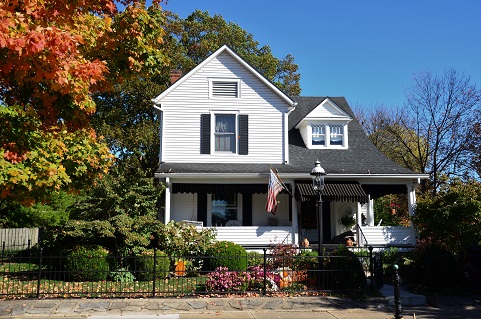
Congrats to the 2020 and early 2021 buyers who locked in fabulously low rates!
As the economy gradually pulls itself out from under the pandemic, people are talking about interest rates rising in 2021 and beyond. While rates will fluctuate, the overall trajectory is on an upward climb. Yet some new mortgage holders will keep those great mortgages on their homes even when they refinance or sell, thanks to assumable loans.
An assumable loan is a perk of federally backed mortgages. It allows the loan terms to stay on the house, even if the title changes names. The loan is ported from the original borrower to the next title holder without the creation of a new loan. The new homeowner picks up the monthly mortgage payments where the original borrower stops.
Marketing a Home With an Assumable Mortgage Loan
If your house has an assumable loan from the FHA, VA, or USDA, you can advertise that when you go to sell. Your future buyer will enjoy the option of taking on that loan later, with the terms you get now as you buy the house. Because assumable mortgages are scarce, you’ll have a stand-out selling point — one that could add substantial value to your offering as interest rates rise. A buyer who assumes your mortgage will retain your low interest rates. Plus, your closing costs will be streamlined. Usually, a new appraisal is not necessary when a mortgage continues.
A future buyer who takes up your assumable loan doesn’t make a regular down payment. They buyer typically pays the difference between the mortgage balance they take on, and the price of the house. This way, you’ll be paid fair value for the equity you’ve built up in the home.
Some buyers will still need to get financing to buy a home with an assumed loan. And sometimes the mortgage won’t permit the next buyer to bring new financing into the mix. So, not all potential buyers will be able to benefit. But some will. This is a factor to keep in mind when you’re deciding whether it’s a good idea to apply for a government-back mortgage.
☛ Are you thinking of submitting a post-pandemic home loan application? Find out about Mortgage Approvals: The New Landscape for Post-Pandemic Home Buyers on Deeds.com.
Good News for Loan Applicants With Co-Buyers
The U.S. Federal Housing Administration (FHA) allows assumable mortgages. This is very good news if you’re get an FHA loan approval with a co-buyer helping you make the purchase.
To reduce their own risk, lenders commonly require a co-borrower to be a buyer, so both borrowers have a stake in the house. When co-borrowers are also both co-buyers, both are named on the title.
☛ Is a co-signer helping you get a home loan approval? You might need both co-borrowers on the title to the home at first. Mortgage lenders prefer — and often require — that every borrower’s name goes on the title. See more at: How Getting a Mortgage With a Co-Borrower Affects the Deed.
The co-buyers may have a plan to shift the home into the primary buyer’s sole name later on. This can be handled with no need to reapply for a new mortgage, if the co-borrowers have an assumable loan. When you, as primary borrower, are ready to refinance the home independently, you and your co-buyer can use a quitclaim deed, for example, to sign the deed over to you as sole homeowner.
At that time, you must be financially eligible to take on the existing loan yourself. Once again, your mortgage specialist will work with you to document your assets, debt, and income.
Significant and Multiple Benefits in Assumable Loans

The homeowner who takes over an assumable loan receives multiple financial benefits. Consider these points:
- Taking over the prior owner’s loan means the new owner need not reset a 30-year mortgage back to the beginning. Win!
- The new mortgage holder steps into the mortgage that’s already partially paid down, and gets to start out paying more principal and less interest than a new mortgage would require. Another win!
- If interest rates are going up, the new mortgage holder gets to enjoy the rates that the prior owner locked in. Massive win!
Never have perks like these been more attractive than right now.
A Mortgage From One Vet to Another
Loans backed by the U.S. Department of Veterans Affairs are assumable. A VA loan assumption is commonly vet-to-vet. One vet’s eligibility for the loan is replaced by the next homeowner.
This arrangement can save money, but it doesn’t always speed the sale process! If authorized, the loan servicer will determine that the buyer meets lender and VA borrower criteria. If the lender needs to forward the application to the VA’s Regional Loan Center, that decision could take a few weeks. The pace of approval can be a pain point for a buyer.
Pro tip: The buyer might request a rental arrangement while the parties wait for the final approval for loan assumption.
The buyer must have funds to cover the home price, minus the mortgage, plus the closing costs. If the buyer has the funds, assuming a loan at a low rate can be very sensible. There is a loan funding fee. But it’s less than the funding fee for a new VA loan. There is no private mortgage insurance (PMI) necessary with a VA loan.
Find out if you qualify for a mortgage from a lender with experience in VA loans. At the same time, ask questions about the terms. If you’re the seller, know whether your VA loan benefits will be suspended until the new buyer has paid off the loan assumed from you. If that’s the case, it’s a safer deal to be released from the assumable loan by letting the buyer apply for a new mortgage.
Yes, USDA Loans Are Assumable

Hoping to find an assumable loan? Don’t overlook homes with mortgages backed by the U.S. Department of Agriculture. They come with several benefits for the eligible borrower, and you can buy property across the United States with USDA Rural Development loans. Suburban homes are typically eligible.
Yes, USDA loans are assumable. The loan contracts say a borrower “must obtain Agency approval before transferring title to a property via an assumption…” Then: “After the assumption is completed, the new customer will be liable for the debt.”
The new customer will need to pay an assumption fee. Yet there can be impressive savings on the funding fee and a number of other closing costs.
The upfront fee is 1% of the loan and the annual fee is .35% of the current balance. As with the VA loans, there is no down payment minimum. As the USDA itself puts the point, “Along with VA loans, this government-backed loan option is one of the last remaining $0 down payment mortgage options out there.”
The USDA loan is quite attractive in its own right — and all the more so when you buy a house with an interest rates are bound to rise.
A Note on Novation, and Why It Matters
The novation of a loan completely transfers the loan obligation to a new mortgage holder. It forms a new agreement but carries over the rate and terms of the loan. Novation is valuable to the first borrower, who is released from the original mortgage agreement. In contrast, a simple assumption is an agreement between the parties that one will take over from the other. This does not release the original mortgage holder from liability to the lender.
Sellers, proceed with caution. Outside of rare circumstances, such as agreements between close friends or family members, the original borrower should think carefully before passing a mortgage along without a liability release. Speak to your mortgage servicer about the terms before jumping in. Consult with a local real estate lawyer if you have questions. Otherwise, you know what assume can make of you and me!
Selling Point in a Time of Rising Interest Rates
Government agencies, of course, have sets of regulations to follow. Choose a mortgage specialist who is willing to sit down with you and examine whether any mortgage is the right move for your circumstances and goals. You may find that a federally backed, assumable mortgage can go a long way — benefiting you and the next homeowner. If you locked in a great mortgage interest rate with the FHA, for example, your home has that selling point in a time of rising interest rates.
An assumable debt option is a rarity in the world of conventional loans. But it comes standard in government-backed loans. This overlooked benefit is sure to get some new attention as super-low interest rates move into the rear-view mirror.
Photo credits: Andrea Piacquadio, via Pexels, karishea, via Pixabay, and Roger Starnes, Sr., via Unsplash.
